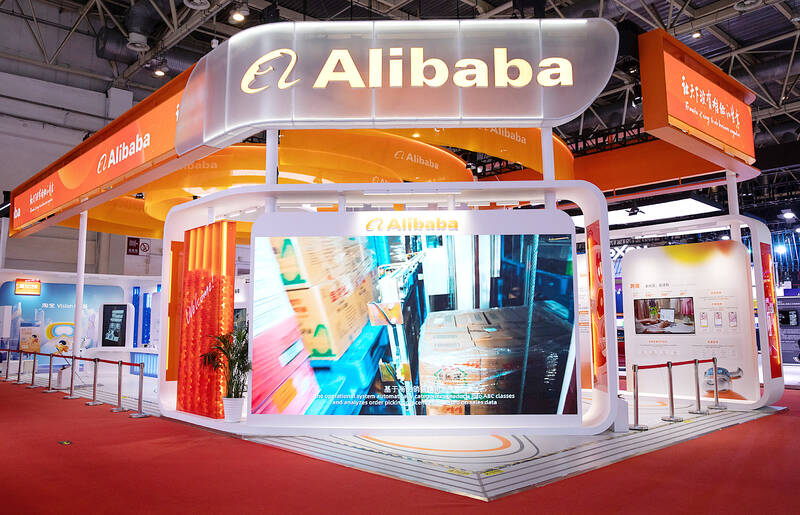Alibaba Group Holding Ltd (阿里巴巴) has agreed to merge its South Korean operations with E-Mart Inc’s e-commerce platform to better compete in the nation’s fast-paced online retail sector.
AliExpress International (全球速賣通) and Gmarket are creating a 50-50 joint venture, according to a stock exchange filing by E-Mart, which confirmed a report by Bloomberg News. The companies plan to make further investments in the joint venture, which would own 100 percent of Gmarket.
The new entity could be valued at about US$4 billion, sources familiar with the matter said.

Photo: EPA-EFE
The deal would help the companies face off against local rivals, including Naver Corp and Coupang Inc.
South Korea’s consumer confidence this month dropped by the most since the outbreak of the COVID-19 pandemic, battered by the political turmoil triggered by South Korean President Yoon Suk-yeol’s declaration of martial law and his impeachment.
Alibaba has been seeking to expand its international footprint to make up for slower growth in its core Chinese e-commerce business. The Internet pioneer’s domestic e-commerce operations reported anemic growth in the third quarter, dragging down financial results that benefited from progress in its cloud division and international business, which encompasses Lazada Group and AliExpress.
Once a dominant player in China’s e-commerce field, Alibaba is struggling to grow amid competition from rising rivals such as PDD Holdings Inc (拼多多) and ByteDance Ltd (字節跳動). The company is now integrating its domestic and international e-commerce operations, and has been steadily selling off holdings it does not consider essential.
E-Mart has been expanding its e-commerce business organically and via acquisitions. It in 2021 acquired a controlling stake in eBay Inc’s South Korean online marketplace for about US$3 billion, expanding its customer base.

Meta Platforms Inc offered US$100 million bonuses to OpenAI employees in an unsuccessful bid to poach the ChatGPT maker’s talent and strengthen its own generative artificial intelligence (AI) teams, OpenAI CEO Sam Altman has said. Facebook’s parent company — a competitor of OpenAI — also offered “giant” annual salaries exceeding US$100 million to OpenAI staffers, Altman said in an interview on the Uncapped with Jack Altman podcast released on Tuesday. “It is crazy,” Sam Altman told his brother Jack in the interview. “I’m really happy that at least so far none of our best people have decided to take them

BYPASSING CHINA TARIFFS: In the first five months of this year, Foxconn sent US$4.4bn of iPhones to the US from India, compared with US$3.7bn in the whole of last year Nearly all the iPhones exported by Foxconn Technology Group (富士康科技集團) from India went to the US between March and last month, customs data showed, far above last year’s average of 50 percent and a clear sign of Apple Inc’s efforts to bypass high US tariffs imposed on China. The numbers, being reported by Reuters for the first time, show that Apple has realigned its India exports to almost exclusively serve the US market, when previously the devices were more widely distributed to nations including the Netherlands and the Czech Republic. During March to last month, Foxconn, known as Hon Hai Precision Industry

PLANS: MSI is also planning to upgrade its service center in the Netherlands Micro-Star International Co (MSI, 微星) yesterday said it plans to set up a server assembly line at its Poland service center this year at the earliest. The computer and peripherals manufacturer expects that the new server assembly line would shorten transportation times in shipments to European countries, a company spokesperson told the Taipei Times by telephone. MSI manufactures motherboards, graphics cards, notebook computers, servers, optical storage devices and communication devices. The company operates plants in Taiwan and China, and runs a global network of service centers. The company is also considering upgrading its service center in the Netherlands into a

Taiwan’s property market is entering a freeze, with mortgage activity across the nation’s six largest cities plummeting in the first quarter, H&B Realty Co (住商不動產) said yesterday, citing mounting pressure on housing demand amid tighter lending rules and regulatory curbs. Mortgage applications in Taipei, New Taipei City, Taoyuan, Taichung, Tainan and Kaohsiung totaled 28,078 from January to March, a sharp 36.3 percent decline from 44,082 in the same period last year, the nation’s largest real-estate brokerage by franchise said, citing data from the Joint Credit Information Center (JCIC, 聯徵中心). “The simultaneous decline across all six cities reflects just how drastically the market